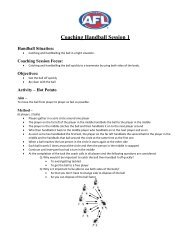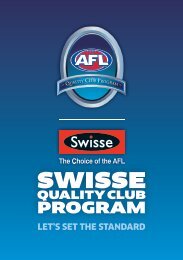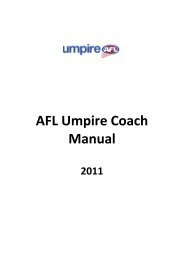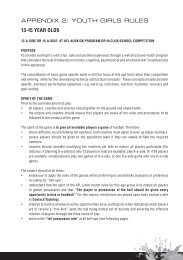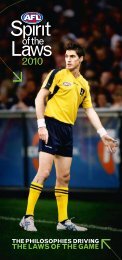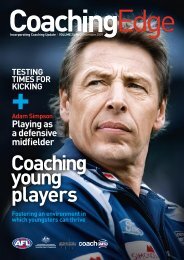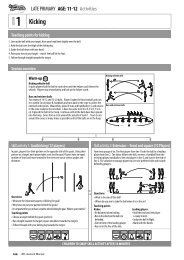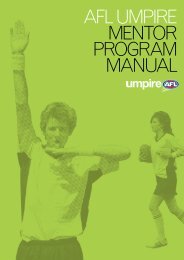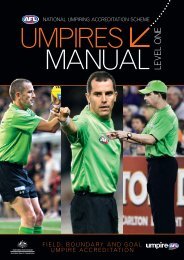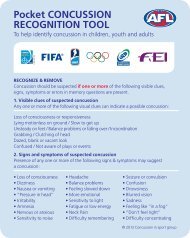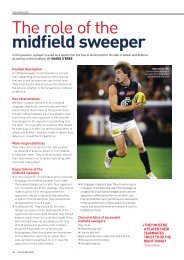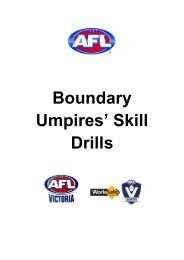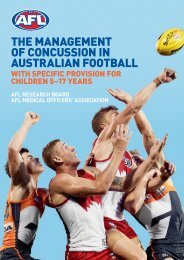2012 Youth Coaching Manual - AFL Community
2012 Youth Coaching Manual - AFL Community
2012 Youth Coaching Manual - AFL Community
You also want an ePaper? Increase the reach of your titles
YUMPU automatically turns print PDFs into web optimized ePapers that Google loves.
During the Practice<br />
• Let players freely experiment without much feedback at first.<br />
• Get players practising as soon as possible so they don’t lose their mental picture or the sense of how the skill is performed.<br />
When Instructing<br />
• Provide feedback as this lets players know how they are going.<br />
• Allow them to practise for a time before offering any feedback.<br />
• Offer specific, constructive, clear and positive feedback.<br />
When providing Reward<br />
• Encourage freely, particularly when an individual’s progress seems slow.<br />
• Set standards according to the capability of each player.<br />
• Understand and allow for the fact that each player will improve at a different rate.<br />
• Only compare players with themselves – what they could do and now what they are doing.<br />
• Avoid comparing players with each other.<br />
Game sense and decision-making training<br />
Game sense is an approach to coaching that uses games as the focus of the training session. By focusing on the game (not<br />
necessarily the full game), players are encouraged to:<br />
• Become more tactically aware and be able to make better decisions during the game in pressure situations.<br />
• Start thinking strategically about game concepts.<br />
• Develop football skills such as kicking and handballing under pressure within a realistic and enjoyable context, rather<br />
than practising them in isolation.<br />
• Develop a greater understanding of the game being played.<br />
Game sense activities also aim to:<br />
• Increase individual and team motivation to training – players love to play games!<br />
• Physiologically prepare the body where conditioning is specific to that of a game.<br />
This approach to coaching is ‘game centred’ rather than ‘technique centred’. While most traditional coaching sessions have<br />
focused on the practise of techniques, the game sense session focuses on the game.<br />
In the past, technique has often been over-emphasised within training sessions. While technique is an important part of<br />
the overall skill, it has often been taught in isolation, without requiring players to think and apply the techniques to the<br />
situations required in the game. By using game sense, players are challenged to think about what they are actually doing,<br />
and why. Players are taught to use the appropriate technique at the right time and place in the pressure situations of a game.<br />
When designed well, mini-games appeal to the players’ (especially adolescents) ability to problem solve and process<br />
information and subsequently raise their levels of attention and desire to do well.<br />
Why use game sense?<br />
The fact that games are intrinsically motivating is probably the best reason why coaches should adopt game sense, but there<br />
are a number of other reasons for using this approach, including:<br />
• Encouraging a holistic approach to the teaching of games – players are taught to solve problems that arise in a game<br />
through tactical awareness and understanding; skills are developed in a more meaningful environment.<br />
• Promotes enjoyment for participation – a fun environment increases motivation levels and encourages participation.<br />
• Assists the beginner, who often has limited technical knowledge of a sport. For instance, for these coaches it is more<br />
appropriate to set challenges for players through games rather than conduct technique-based sessions that are based on<br />
unsound techniques due to a lack of technical knowledge. It helps avoid developing players with inflexible techniques,<br />
that is players who are unable to cope with change in the playing environment.<br />
<strong>AFL</strong> <strong>Youth</strong> <strong>Coaching</strong> <strong>Manual</strong><br />
53



